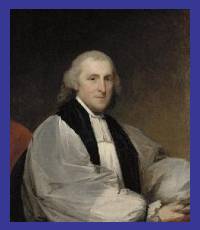William White was born in Philadelphia in 1747, went to
England in 1770 to be ordained deacon and priest, returned in 1772 and
became first an assistant and then the rector of the Church of Christ
and Saint Peter in Philadelphia.
He served as Chaplain of the Continental Congress from 1777 to 1789, and
then as Chaplain of the Senate. Before the American Revolution, there
were no bishops in the colonies (partly because the British government
was reluctant to give the colonies the kind of autonomy that this would
have implied, and partly because many of the colonists were violently
opposed to their presence).
After the Revolution, the establishment of an American episcopate became
imperative. Samuel Seabury
was the first American to be consecrated, in Scotland in 1784. After
action by the English Parliament permitting foreign bishops to
consecrated without taking the oath of allegiance to the King, William
White and Samuel Provoost, having been elected to bishops of
Pennsylvania and New York respectively, sailed to England and were
consecrated bishops on 14 February 1787 by the Archbishop of Canterbury,
the Archbishop of York, the Bishop of Bath and Wells, and the Bishop of
Peterborough.
White was largely responsible for the Constitution of the Protestant
Episcopal Church in the United States of America. At his suggestion, the
system of church government was established more or less as we have it
today. White was insistent that lay leaders take a role in shaping the
life and policy of the Episcopal Church.
He was prepared to have a Church without bishops, but when English law
made bishops in the newly created nation possible, he worked ardently to
bring unity and coherence to the Episcopal Church.
He bridged the gap between the claims and concerns of the clergy of New
England, especially Bishop Seabury, and his friend and colleague, Bishop
Provoost. White was regarded as “a saint, a scholar, and a statesman.”
See his “Case for the Episcopal
Church”.
William White
